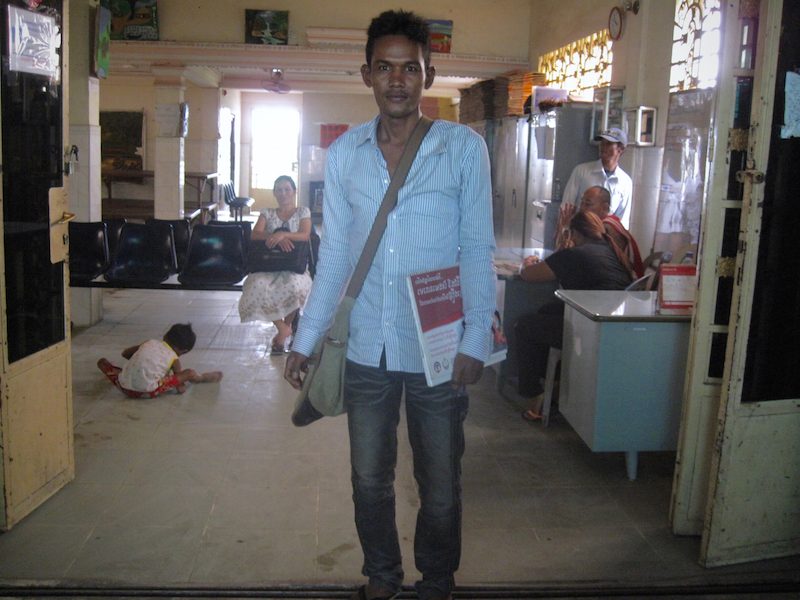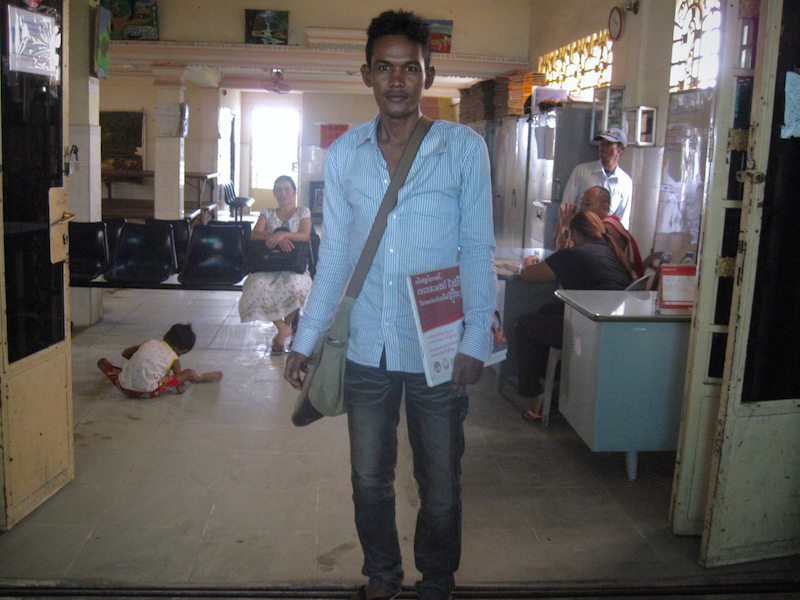A recovering drug user with HIV died 10 days after he walked out of Prey Speu detention center in Phnom Penh, a death an NGO worker attributed to his being denied access to medication and methadone treatment while he was locked up for more than a month.
Thhan Dang, a former heroin user living on the capital’s streets, left Prey Speu on May 2 and died on the street on May 12, Taing Venghui, a community educator with NGO Korsang, said earlier this week.

“The reason that he died was because his health had become really weak. It became weak because he couldn’t receive [anti-retroviral therapy] and methadone,” Mr. Venghui said. “If he wasn’t arrested, he wouldn’t have died.”
Police said a doctor had examined the body and ruled Thhan Dang’s death was the result of a heart attack.
Prey Speu’s director on Tuesday denied that Thhan Dang had even been detained at the center, known as an overcrowded holding site for homeless people, sex workers, drug users and others who authorities wish to keep off the capital’s streets.
“There is no such name on the list. I have never heard of the name Thhan Dang,” director Van Ngat said this week.
According to the rights NGO Licadho, two people died while detained in Prey Speu in 2015—a man drowned in a pond and a woman died of unknown causes—and a homeless man died of illness the year before. According to The Phnom Penh Post, two more people died last year.
Mr. Venghui, also a former drug user, said he knew Thhan Dang, 38, as he had received services from Korsang.
Thhan Dang started receiving methadone, a legal heroin substitute, in 2010 and anti-retroviral therapy to treat his HIV in March 2014. This was arranged through Korsang, which works to reduce drug-related harm among users, according to Taing Phoeuk, Korsang’s executive director.
When Thhan Dang was arrested on March 30 in Phnom Penh, he did not have drugs on him, according to Mr. Venghui. After getting out of Prey Speu, Thhan Dang told Mr. Venghui he had stopped using drugs. However, he did take part in an organized needle exchange on May 8.
While authorities at Prey Speu usually release detainees receiving drug rehabilitation or HIV health services from NGOs, including Korsang, the process to secure their release has been harder since the government started its anti-drug campaign on January 1, Mr. Phoeuk said.
After Thhan Dang was arrested on March 30, the NGO had tried on two occasions last month to get him and two others out of detention, Mr. Phoeuk said.
“The process before was so easy,” he said, explaining they had to submit documents to the center showing its client was receiving methadone treatment.
Now, he said, “It’s a little bit hard to get them out.”
According to Mr. Phoeuk, his staff received the runaround when it twice sought Thhan Dang’s release from Prey Speu late last month.
On a second visit, when two Korsang staff showed up at the center with documents stating that Thhan Dang and two others were receiving methadone through Korsang, they were referred by center staff to the municipal social affairs department to get approval for their clients’ release.
The official they needed to speak with was unavailable that day, Mr. Phoek said.
Sorn Sophal, director of the social affairs department, said this week that those who could provide documented proof that they were HIV positive were released from Prey Speu.
After more than a month in detention, Thhan Dang finally left the center. Mr. Phoeuk said he believes he was allowed to leave Prey Speu of his own free will.
“I think that they didn’t want him to die at the prison [Prey Speu] so they let him out,” he said. “He needed his meds.”
Thhan Dang had a wife and two daughters, but he didn’t live with them, according to Mr. Venghui. His family could not be reached this week.
He had been homeless for a long time when he was introduced to drugs in 2000 by other people on the street, Mr. Venghui said. Thhan Dang had told him that he contracted HIV from sharing syringes.
Mr. Phoeuk, Korsang’s executive director, said that Thhan Dang had worked with Korsang as a peer educator for about a year around 2014, sharing health information with drug users.
“He worked with us in reaching other clients in the community,” he said.
His last interaction with Korsang outreach staff was on May 8, when he participated in a needle exchange at a hotspot for users, ”where they meet and inject drugs,” Mr. Phoeuk said.
“We tried to get him back on the methadone” and anti-retroviral therapy, Mr. Phoeuk said. “He was not ready, I think. He wanted it, but not at that moment.”
Outreach staff planned to meet him again, he added, but four days later Thhan Dang was dead. He had received methadone treatment at Khmer-Soviet Hospital on the day he died, Mr. Venghui said.
That morning, after receiving his dose, “he walked out from the hospital and then he walked to where he was found dead” on a sidewalk near Phsar Olympic.
Mr. Venghui said he learned about his death from local news.
Photographs published by a local Khmer-language news outlet show his body sprawled across a sack of scavenged recyclables, shirtless, so thin his ribs were visible.
Ung Ratanak, police chief at Chamkar Mon district’s Olympic commune, confirmed that the body of an unidentified man was found in the area of Phsar Olympic on May 12.
A witness reportedly saw Thhan Dang vomiting against a wall at about 6 p.m. that day, but thinking he was drunk, did not intervene, Mr. Ratanak said.
His body was found about an hour later and sent to Ang Taminh Pagoda, where he was cremated within days, the police chief said.
At Prey Speu, director Van Ngat, said the center had doctors to provide basic treatment and HIV testing to detainees and did not retain drug users for long, sending them to a government-run rehab center.
Those who test positive for HIV may receive medication from a doctor stationed at the center or from NGOs, Mr. Ngat added.
But Korsang and Khana, another NGO that helps drug users and people living with HIV, both say that their clients detained at Prey Speu claim they did not have access to either drug or HIV treatment.
“The government, they say they have everything. They have the health clinic [at Prey Speu]. But actually the reality is different,” Choub Sok Chamreun, Khana’s executive director, said on Monday.
Mr. Sok Chamreun said someone like Thhan Dang could not stop taking methadone and HIV medications without health consequences.
“If you don’t have methadone daily, you will have big withdrawal symptoms. And that could be one of the issues,” he said. “If someone stops taking medication for one month, this could link to treatment failure for [HIV] treatment.”
Thhan Dang could have died from an opportunistic infection, multiple infections or an overdose upon leaving Prey Speu, he said.
Mr. Venghui, the community educator, said Thhan Dang had lost so much weight after about 20 days of detention that he barely recognized him when he visited the center.
City Hall spokesman Met Measpheakdey said people picked up by authorities from the streets, such as homeless people and drug users, were “temporarily” placed in the center for “only one or two days” while they waited for partnering organizations to help.
Both he, Mr. Ngat and Mr. Sophal, of the social affairs department, said drug users were sent to Mondule Orkhas Khnum (My Opportunity Center) in Phnom Penh’s Sen Sok district for treatment.
Mom Chandavy, head of the government-run rehabilitation center, said users stay for three months to a year, depending on their level of addiction, receiving treatment and vocational training.
“We check their health and do a reassessment before we allow” them to leave, Ms. Chandavy said.
Mondule Orkhas Khnum is currently treating about 1,000 drug users, according to Mr. Measpheakdey.
Although Prey Speu is officially a social affairs center for poor people, critics say it serves as a detention site for many found on the street and can be significantly overcrowded.
“There’s absolutely no legal basis for detaining people because they’re perceived as undesirable by the city,” Naly Pilorge, deputy director of advocacy for Licadho, said this week, reiterating its call for Prey Speu to be closed.
“Many of these people have not committed a crime except for being on the streets,” she said.
Since the start of the government’s six-month anti-drug campaign, prisons and rehabilitation centers have become “packed,” Korsang’s Mr. Phoeuk said.
Four of eight people who were receiving services through Korsang before they were detained in Prey Speu are currently without medication for HIV, Mr. Phoeuk said. Six of the eight also had been receiving methadone.
“They shouldn’t discontinue their treatment once they get arrested,” he said. “Cause that’s what’s happening. Once they get arrested, there’s no treatment for them.”
Thhan Dang lost his right to health care when he was arrested, Mr. Venghui said.
“He should not have ended up like that,” he said.




